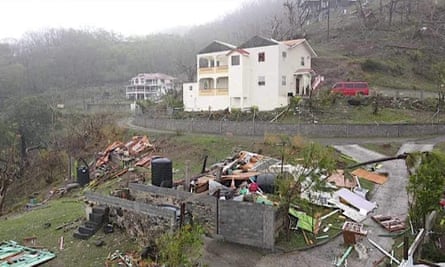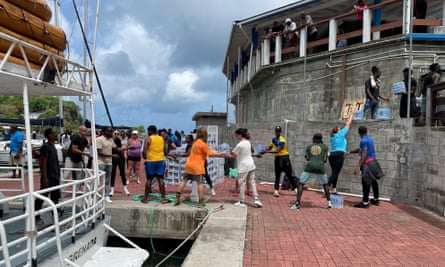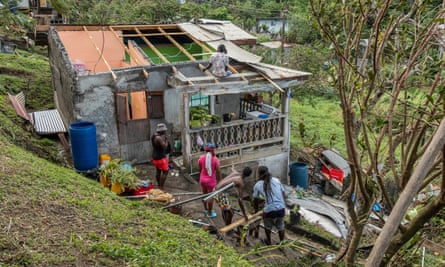This should have been a week of celebration in the Caribbean country of St Vincent and the Grenadines (SVG). The annual Vincy Mas carnival, which attracts thousands of tourists, had advertised a packed schedule of costume parades and soca competitions.
Instead, the Vincentian population is reeling from what the country’s prime minister has described as the “utter devastation” wrought by Hurricane Beryl, which ravaged the multi-island country and its eastern Caribbean neighbour Grenada.
Images and videos shared on social media showed apocalyptic scenes in SVG and Grenada: flattened houses; damaged police stations, schools and hospitals; streets strewn with the remnants of mangled and dismantled roofs, and towering swells rushing into roads and properties. They told a powerful story of panic, fear and anguish.
At least four people in the Caribbean and three in Venezuela have died during the hurricane, which is barrelling towards Jamaica, having reached category 5 status. On Facebook, among the prayers, regional camaraderie and global messages of support, there are desperate pleas for help and information about missing loved ones.

Several messages begged for information about family members on the SVG islands of Canouan, Union Island and Mayreau, which along with the Grenadian islands of Carriacou and Petite Martinique are thought to be among the worst-affected.
One distraught mother wrote: “My daughter [is] in a house in Canouan. Her roof is blowing off, and she is pregnant. Please send help, she is alone … please send help!”
But officials trying to reach the islands to assess damage, deliver aid and arrange evacuation have been hampered by dangerous conditions and a near-total communication blackout.
Late on Monday, Grenada’s prime minister, Dickon Mitchell, told a press conference that Carriacou had been flattened in half an hour. By Tuesday evening, after visiting Carriacou, he described “Armageddon-like” scenes of “almost total destruction”, with approximately 98% of building structures damaged or destroyed and an almost complete wipeout of the electrical grid and communications systems.
“Having seen it myself, there is really nothing that could prepare you to see this level of destruction. It is almost Armageddon-like. Almost total damage or destruction of all buildings, whether they be public buildings, homes or private facilities. Complete devastation and destruction of agriculture, complete and total destruction of the natural environment. There is literally no vegetation left anywhere on the island of Carriacou,” he said.
Union Island suffered a similar fate, with 90% of houses severely damaged or destroyed.
In a video posted online, the Vincentian journalist Demion McTair described the “unthinkable” devastation, which he likened to the aftermath of a bombing. Walking through streets littered with debris and lined with gutted and roofless houses, he captured the anguish of residents who were being evacuated by ferry.
“Just imagine stoves flying in the air, house flying, lifting up, tearing apart and just going in the wind. Just like that … Just imagine,” said one woman, her voice trailing away as she choked back tears.
A young man described sleeping on concrete as they waited for help. “About 25 of us slept on [roofing sheets] with sheets spread on it. We had cockroaches on our feet. It was cold and wet,” he said.
Another woman said she had seen a number of injured elderly people, and a man who was gashed across his chest by a zinc roofing sheet as he tried to rescue his father.

The SVG prime minister, Ralph Gonsalves, praised the resilience of the country’s people, who are facing the “immense destruction” of Beryl while still recovering from the impact of a major volcanic eruption in 2021, which displaced more than 20,000 people and caused more than $200m worth of damage.
“The faces of our men and women are strained and anxious,” he said. “But tomorrow, we get up with the conviction to rebuild our individual lives and our family’s lives. To rebuild our country, to recover.”
Gonsalves expressed concerns about access to international finance to fund rebuilding and called on richer countries to honour their climate commitments.
after newsletter promotion
“For the major emitters of greenhouse gases, those who contribute most to global warning, you are getting a lot of talking, but you are not seeing a lot of action – as in making money available to small-island developing states and other vulnerable countries.

“I am hopeful that what is happening – and we are quite early in the hurricane season – will alert them to our vulnerabilities, our weaknesses and encourage them to honour the commitments they have made on a range of issues, from the Paris accord to the current time,” he said.
The Commonwealth secretary general, Patricia Scotland, joined the call for better climate finance support to small and vulnerable countries affected by hurricanes, which have been made increasingly frequent and dangerous by global heating.
Scotland had been on her way to the now-postponed 20-country Caribbean Community (Caricom) leaders’ summit in Grenada when a state of emergency was declared in the country.
She said in a statement: “This is the new reality that we face. Once a rare occurrence, hurricanes are severely damaging small island economies with greater intensity and regularity. In 2017, Hurricane Maria devastated my own country of birth, Dominica. In 2019, Dorian, the most powerful hurricane to ever hit the Bahamas, tore through the island nation, causing billions in damage. In 2023, Vanuatu was devastated by a category 5 cyclone, Lola.
“The damage of these shocks is deepened by the lack of adequate financial support. Small island states, which have done the least to cause this climate crisis and have contributed only 1% of all global carbon dioxide emissions, struggle to unlock climate finance. In 2019, they had access to only $1.5bn out of the $100bn pledged to developing countries.”
Mitchell is hoping to trigger his country’s catastrophic risk insurance policy as he calculates the massive cost of recovery, telling reporters that the clean-up alone will take tens of millions of dollars.
With storm force winds felt in Jamaica on Wednesday morning, where the prime minister, Andrew Holness, has triggered emergency orders and preparations, Beryl is likely to cause yet more carnage in the Caribbean.
And even as Mitchell and Gonsalves galvanise regional and international support, including an emergency meeting with Caricom, they received news of another tropical wave, raising fears that the grim prediction from the US National Oceanic and Atmospheric Administration of an “above normal” hurricane season is coming true.
Source: theguardian.com


















